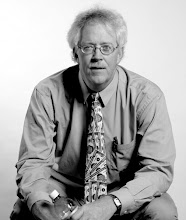Students in college or university mass communication programs are worried, especially those who graduate this year and those within a year of graduation. They are worried there won't be many jobs open when they graduate.
Ironically, the news media has been effective telling the story of the collapse of newspapers, and the merging of jobs in other news media. These stories make it seem as though there are no jobs for students with good writing ability and well-honed visual communication skills.
Clearly, newspapers-- especially those that cling to the traditional ink and paper delivery system-- are having difficult times. Students hear about their colleagues who graduated a year or two before them and who are having trouble finding jobs. Or, of those that have found jobs in media, many are being asked to learn additional skills and do more.
This kind of information has caused current students to rethink their career plans. Most, thankfully, haven't given up on the idea of working in mass communication. Many are looking more seriously at combining other education programs-- a minor, second major, or graduate school-- that will hopefully give them additional skills and make them more valuable to a potential employer.
Though the economy has been in a downturn, I personally don't think the picture is all doom and gloom for most mass com majors.
In the mass communication program at Winona State University where I teach, each student in the major chooses a specific area of emphasis from among five options: advertising, broadcasting, journalism, photojournalism, or public relations. In the core of the major, all students take one class that serves as an overview of the media, a visual communication course, a journalism class, a course in issues and ethics in media, and then a variety of electives from across the department's catalog. They also follow a plan taking a series of courses in their particular option.
In mass communication programs like this, students get a broad education in the media field as a whole, and a narrow and deep focus in one specific area. This kind of program allows graduates greater flexibility to move more seamlessly between media-related positions, and makes them more qualified for newer hybrid positions in media.
Many media companies no longer have distinct positions such as writer, still photographer, videographer, sound technician or editor. An employee at a newspaper may shoot still images, capture video and write an article. They may also be edit the work-- words, audio and images-- and prepare the packages for the print edition or website.
Similarly, employees at traditional radio stations are capturing and posting video and still images to their websites. TV station newsrooms, well-versed in working with images, audio and video, are also combining tasks and are using more one-man band professionals who can do it all themselves.
The wild card in the media world, and the place where there is tremendous growth potential, is in web-based media not affiliated with traditional media outlets. Hundreds of new websites are developed each day. They all need content on their web pages and connect with their audiences.
Some of these new and developing sites may have a journalistic mission and rely on advertising support, like traditional media. Others may have a different business model, but still will rely on effective communication with a target audience. Skills taught in mass communication programs are perfectly targeted to these new web-based media. Well done websites need skilled professionals to write engaging copy and create meaningful images that communicate an intended message.
The material taught in mass communication programs is evolving and changing. The skills in mass communication remain the same, even though delivery methods are different and more technologically advanced.
There is still tremendous opportunity in the mass communication field. Due to the economic recession, growth is perhaps slower than it might have been. Nonetheless, use of the web and its new possibilities will continue to grow, and provide opportunity for mass communication graduates into the future.
Monday, May 11, 2009
Mass Com Jobs: Changing, Not Gone
Labels:
College graduates,
convergence,
mass communication,
mass media
Subscribe to:
Post Comments (Atom)

When I graduated last spring with a photoj degree I was worried I didn't have the technical skills in multimedia work to find a full-time photo position with a newspaper. As it turned out, my experience with the Winona Daily and my internship was enough to get me employed. But now I face another short coming, the newspaper I am with, The N'West Iowa REVIEW, does not have a website and has no need for video or audio slideshows. I am a pure photographer for the paper and only have to write two sentences at a time. Eventually, I want to get to a daily newspaper and evolve into a multimedia journalist, but I think it is going to be another challenge competing with others who have done everything. I am jealous of the current WSU students that are being pushed into the multimedia work since they will know more than me when they graduate.
ReplyDeleteI'm at the exact opposite of the spectrum from Andrew. When I got my first job out of college I shot primarily for the paper, then I moved into producing more for the web: photo galleries, audio slideshows and video. I then moved to a Gannett paper and everything changed, audio slideshows stopped because they didn't generate enough revenue and video became a high priority. After that we moved into live streaming video via Mogulus of sporting events and mayoral forums. Sometimes I miss being able to focus on grabbing that one great shot, I'll admit I'm a little jealous of Andrew.
ReplyDelete